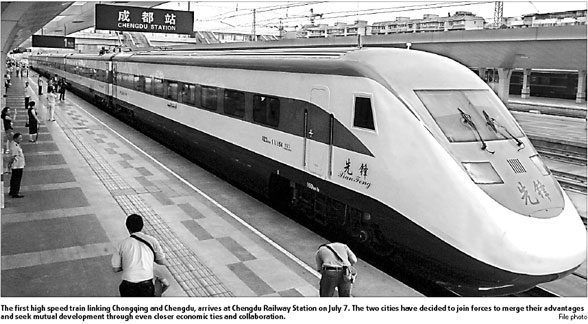A new engine revs up in the west
The Chengyu Economic Zone (CEZ), an initiative by Southwest China's Sichuan Province and Chongqing Municipality, is set to become another engine of economic growth for the country's vast western region, experts say.
Centered on Chengdu, Sichuan's capital, and the city of Chongqing, the economic zone incorporates 14 cities of Sichuan and 23 districts and counties of Chongqing.
The zone, with an area of 155,000 square kilometers, about a quarter of the total area of Sichuan and Chong-qing, has a population of 80 million and contribute more than half of the combined GDP of the two regions.

The two cities, which once considered each other as rivals in many aspects, have decided to join forces to merge their advantages and seek mutual development through even closer economic ties and collaboration.
Jiang Jufeng, governor of Sichuan, and Chongqing mayor Wang Hongju signed an agreement in April to work on the CEZ.
Both sides hope to connect Chengdu and Chongqing through highways, railway and waterways.
"We will try to win the central government's consent to list the economic zone as a State-level key development zone and receive more support in infrastructure investment, and prepare for the industrial transfer from the more developed coastal areas into the area," said Wang Huaichen, vice-governor of Sichuan.
The economic zone will become the biggest city cluster in western China and its aim is to become another regional economic powerhouse like the Yangtze River Delta, Pearl River Delta and the Bohai Bay Region, Wang said.
According to the agreement, both sides will give priority to the construction of infrastructure first, such as speeding up point-to-point fast passage and road linking the two cities.
Yang Qingyu, director of the development and reform commission of Chongqing, said a rapid rail link between Chongqing and Chengdu, which is expected to be finished by 2010, will cut travel time to one and half hours between the two cities.
"The rail link will lower industrial costs and enhance the competitiveness of the economic zone," Yang said.
The participants at the meeting also pledged to improve the current waterway transportation, power grid and logistic facilities for mutual support and resource sharing. They also agreed to build an open and integrated market to break down the administrative barriers.
The restrictions on permanent residence will be scrapped for employees within the zone to encourage free flow of talent.
The two sides decided to foster and build the economic zone into a base for heavy equipment manufacture, hi-tech, clean resources, national defense technology and agricultural products, according to the agreement.
"Cross-regional large-scale project will be constructed better and faster with the cooperation of both sides," said Chongqing mayor Wang.
The two sides reached a consensus on environmental protection to strictly abide by the rule on limits to industrial pollutants. They agreed to map out an industrial layout and deploy major projects in accordance with the resources and the environmental capacity of the area.
They will also form a coalition to protect the water condition of the upper reaches of the Yangtze River by working out an ecological compensation system and launching forestation projects along the river.
Experts have predicted that the planned economic zone, which is already the most developed area in the western part of the country, will become a major engine of growth for the region.
It is expected that the area, which now accounts for about 5 percent of the national GDP, will leap to 10 percent in another five to 10 years.
The National Development and Reform Commission in June granted permission to Chengdu and Chong-qing to conceive policies and start pilot projects to close the gap between urban and rural areas.
A series of pilot projects like a unified administrative management mechanism, social security network and a unified permanent residence system are under consideration.
Peng Zhenhuai, a professor from Peking University, said these moves will help the area get more preferential policies in investment.
"The central government is likely to grant more policy support to facilitate the implementation of these reforms, like setting up a bonded zone and permission of more access in the fields of finance and tourism to attract foreign investment," Peng said.
"It will also receive more monetary support from the central coffers to overhaul the countryside and develop agriculture."
Sheng Yi, a researcher with the Sichuan Provincial Academy of Social Sciences, said the economic zone has great potential to become the driving force for the economic prosperity of western China.
The region, with dense population, rich resources and advanced transportation, has been one of the major bases for heavy mechanical equipment manufacturers, automobile and military plane production, water and natural gas resources development as well as agriculture.
(Shanghai Start 09/07/2007 page9)














